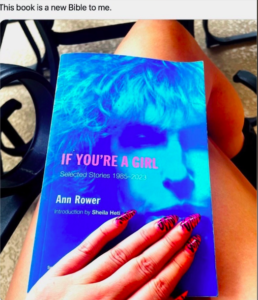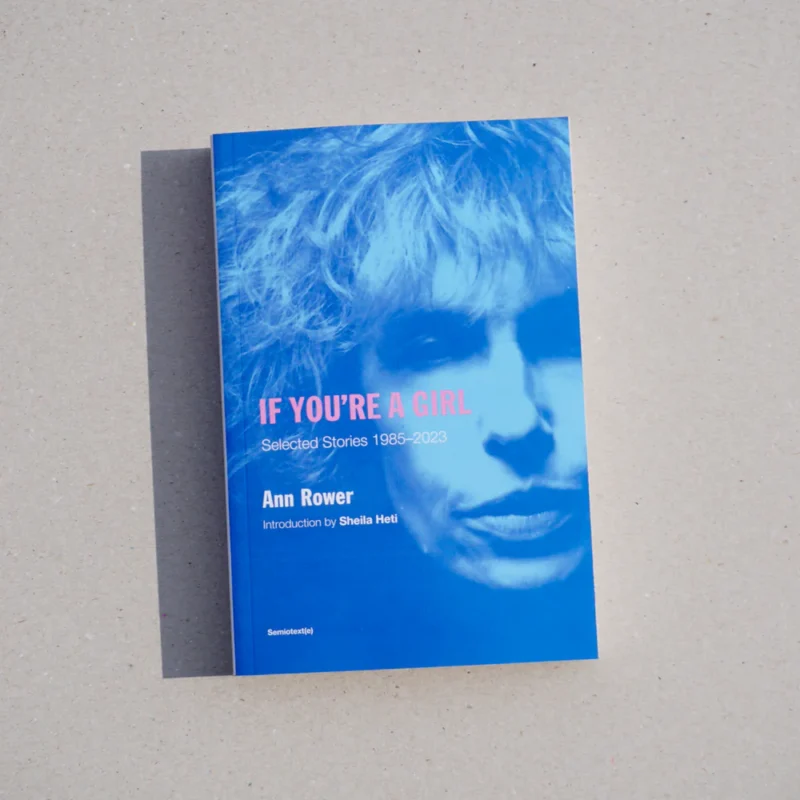GABRIELA BERNABEU reviews the revised and expanded edition of Ann Rower’s iconic If You’re a Girl: Selected Stories 1985-2023.
Ann Rower’s If You’re a Girl was originally published in 1990 by Semiotext(e) alongside Cookie Mueller’s cult classic Walking Through Clear Water in a Pool Painted Black. Aside from being friends, the authors share many parallels, most notably their impulse to write, or, more accurately, their inability to stop. “I started writing when I was six and have never stopped completely,” Mueller once remarked, which Rower now closely echoes: “my last book, I thought to myself, though I would never stop writing. Could never.” It struck me odd that I found relatively little on Rower when compared to her much-celebrated counterpart. Though she (relatably) fantasised that befriending Cookie would get her “invited to all these cool parties with all these cool artists,” her own life certainly does not fall short of sensational: she toured with Kathy Acker and Lynne Tillman, wrote plays with Francis Ford Coppola, took LSD from Timothy Leary alongside Allen Ginsberg and Peter Orlovsky, danced for Martha Graham, and ended up in a hot tub with Diane di Prima.

But, as Rower herself wisely observes, while good seems to perpetuate more good, bad also “seems to generate bad.” So when her long-time partner, Heather Lewis, committed suicide in 2002, Rower abandoned writing altogether for nearly twenty years. Yet, despite the hiatus, her writer’s affidavit holds true, attested for by the revised and expanded edition of If You’re a Girl – a dizzying, and dazzling, “circling back,” comprising the original stories laced with new writings from 2023, and selected excerpts from her two novels, Armed Response (1995) and Lee & Elaine (2002).
It’s with this that she begins the collection, reflecting on her complicated feelings towards Lewis in “Notice,” entitled after Lewis’ own novel which was posthumously published alongside Rower’s. The way she speaks of loss may come as a shock to some, but anyone who knows it well will recognize only painstaking honesty. Pain and humour make the double-edged sword of grief, she knows. An unflinching command over syntax is enough to remind the reader of this truth. Ironically, it appears most virtuosically in the haunting childhood anecdote of her uncle Leo Robin, Hollywood songwriter whose “fondness for clever titles, funny rhymes, corny puns, off-colour double meanings” Rower claims to have inherited. Dirt-covered from playing outside in the yard, young Leo’s mother cleans him up only for him to begin sobbing inconsolably, hilariously begging to put the dirt back on his face. Only on “January 3, at Hillside Memorial Park, in sunny California,” Rower coolly notes, did he finally.

But the at times striking confessionalism does not end there, as the reader is quickly made privy not just to the writer’s innermost life – her voice unchanged, if not more unfiltered, at age eighty-eight – but to that of the characters she chances. Lovers, close friends, and acquaintances alike, nobody is invulnerable to Rower’s minutious eye. She seems to have no problem sharing that Heather was “terribly loud” during sex, or that Tim Leary struck her as “an asshole,” or that her ex-husband refused to fly with her to Puerto Rico to get a (then-illegal) abortion. Though, this doesn’t seem too far out of character for someone who sees “a typical city distance” as “perfect for that urban interplay of exhibitionism and voyeurism you can’t help getting into.” It does, however, land her in some awkward situations. In “Trick or Treat,” for instance, she records a comical argument with her friend Neil, furious, because she had written that he began “walking funny” ever since working for a whorehouse. In reality, he was “limping” because he had “hurt his knee”, “Don’t you fuckin’ remember anything?”! Yes, a writer’s life is not easy…
But the book is as much about Rower’s life as it is about Rower writing her life. The stories unfold rapidly, breathlessly, remarkably maintaining their force as they hopscotch from one person to another, one time frame to another (note the non-chronological arrangement of the collection itself) – leaving the impression that every fleeting moment has some profound consequence. All the while faithful to that characteristic “unedited” style which makes it feel like you’re really having a conversation. “Maybe I’d better cut this part. It’s kind of embarrassing,” she admits on more than one occasion. Describing her relationship to her PT, she speaks of cathexis: “the investment of mental or emotional energy in a person, object, or idea”; but by the end, it’s clear that her truest attachment is to us: “There was really no one left to tell who would get it. Until now, I suppose, when I can finally tell it, tell this, dear reader, to you.”
Suggested in her short essay on transcription, “you always fall in love with the voices you’re transcribing.” Writing, then, for Rower is incarnation – “they’re trapped on the tapes and only you can release them.” She calls this “Transfiction.” In the same way, the real and unreal become conflated in the psychedelic story “Vito in Europe,” where she conjures a paranoiac tale about a next-door neighbour, photographing her life through the window and push-pinning the photos onto his wall. Not until many pages later, after a visit to the eye doctor and new contact lenses, do we learn that her neighbour really did have photos of her hung up; that “there was no metaphysical or existential doubt involved here about the distance,” she just never could see far enough. Indeed, through the seemingly fragmented structure of the collection there is one thread that runs deep and remains faithful: serendipity. Like endless Russian dolls, there is always a story within a story; a tangent; a consequence. A confusing W.H. Auden line leads to a phone call with the poet and East Village neighbour who happens to be doing a reading at the very college where Rower teaches. He incidentally also seems to have lost the coordinates to this reading, and so invites her over for tea. After all, it was her caretaker’s coincidental running into her future physical therapist, and her friend’s accidental finding of an earlier version of her book that ultimately led to the creation of this new one, in perfect butterfly effect. Indeed, if there is one God for Rower, it’s accidents.
Featured image courtesy of London Centre for Book Arts.





